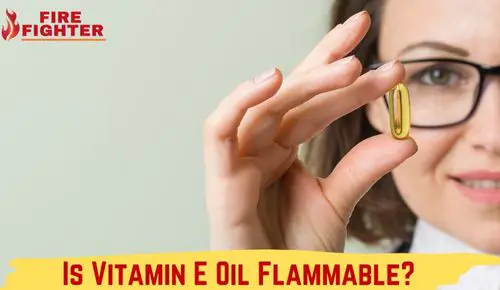Is Vitamin E Oil Flammable? The Truth
Vitamin E oil is a popular remedy for skin care, but many wonder if it is flammable. In this blog post, we will explore the properties of vitamin E oil and discuss whether it is flammable. From the safety precautions you should take to the potential risks associated with its usage, we will cover it all.
So, read on to learn more about vitamin E oil and whether it is flammable.
Contents
What Is Vitamin E Oil?
Vitamin E oil is a powerful antioxidant that can be used to treat a variety of skin conditions. It is derived from the tocopherols found in plants and is available in various forms, including liquid, capsules, and creams. Vitamin E oil is often used to reduce the appearance of wrinkles, scars, and stretch marks, as well as to treat dry, damaged, and aging skin.
Vitamin E oil is made up of two components, tocopherols and tocotrienols. Both of these components are important for your skin health as they help to protect your cells from damage. Vitamin E oil can be used as a topical application, in supplements, or taken orally.
Vitamin E is an antioxidant that helps protect the body’s cells from damage caused by free radicals. Free radicals are unstable molecules that can damage cells and cause disease. Vitamin E oil can help reduce damage caused by free radicals, allowing the skin to repair itself and stay healthy.
Is Vitamin E Oil Flammable?
Vitamin E oil, derived from vitamin E found in some plants, is not generally considered flammable. However, it can become combustible when exposed to certain temperatures and conditions.
For example, it may ignite and burn when heated to a temperature of 495°F (257°C) or higher for an extended period. Since the smoke from burning Vitamin E oil has been linked to respiratory problems, it should be handled with care and kept away from high heat sources such as open flames.

The International Fire Code states that Vitamin E oil must be stored away from any sources of heat or flame and kept below 140°F (60°C). It should also be kept out of direct sunlight to avoid excessive heat buildup, which could lead to combustion.
What Is Vitamin E Oil Used For?
Vitamin E oil is a versatile and natural product used for various purposes. It’s an antioxidant that helps protect the body from damage caused by free radicals.
Free radical damage has been linked to health concerns such as cancer, heart disease, and premature aging. Vitamin E oil also works as an anti-inflammatory, helping to soothe inflammation in the skin and scalp.
In addition, vitamin E oil is also known for its moisturizing properties, helping protect skin from dryness and flaking.
It can be applied directly to the skin or taken orally as a supplement to increase its effectiveness. Vitamin E oil has even been used to help reduce the appearance of scars and stretch marks and promote hair growth.
Finally, vitamin E oil has antioxidant properties that can benefit the entire body by strengthening the immune system and improving overall health.
How Does It React To Heat?
Vitamin E oil is not flammable but has an extremely low flash point and is highly combustible. It can easily ignite when exposed to around 140-205°C (284-410°F).
When heated, it can release potentially toxic fumes that irritate the skin, eyes and throat. Inhaling these fumes can also cause respiratory issues such as coughing, difficulty breathing, and a burning sensation in the lungs.
Moreover, when exposed to high heat levels, vitamin E oil may also break down into hazardous chemicals such as benzene and various hydrocarbons.
Therefore, proper ventilation must be maintained to ensure safety when working with this substance.
Finally, it’s important to remember that Vitamin E oil has a low boiling point and boiling it could lead to an explosion or fire hazard if not done in a controlled environment.
Is Vitamin A Flammable?
No, vitamin A is not flammable. Vitamin A is an essential fat-soluble vitamin found in dairy products, fish, and certain vegetables.
It is necessary for normal vision, healthy skin, and a robust immune system. Vitamin A is also important for developing bones and other tissues in the body. As it does not have the properties of being combustible or easily ignited, it is not considered to be flammable.
Is Vitamin E Flammable?
No, vitamin E is not flammable. Vitamin E is a fat-soluble, essential nutrient found in some foods, and it plays an important role in helping to maintain the health of cells and skin. It is also an antioxidant that helps protect cells from damage caused by free radicals.
The most common form of vitamin E is alpha-tocopherol, found in vegetable oils, nuts, seeds, and leafy green vegetables. In addition to being nonflammable, vitamin E has a wide range of potential health benefits, including promoting immunity to infection, reducing inflammation and improving cognitive function.
Conclusion
In conclusion, vitamin E oil is not highly flammable. Though it can be ignited and will burn, its low flashpoint and low heat of combustion make it less hazardous to handle than other materials.
However, due to the presence of oxygenated compounds in the oil, caution should still be exercised when handling any open containers of vitamin E oil near a source of heat or flame.
When storing high quantities of vitamin E oil, appropriate measures should be taken to ensure safe storage practices, such as keeping containers away from high heat sources and making sure lids are securely fastened on all containers. Adhering to these safety procedures can greatly reduce the risk of handling and storing vitamin E oil.

Hi, I m Aaron Smith, a firefighter, and creator of Firefighterline.com, a website that provides top-notch training courses for firefighting organizations. After completing my studies, I quickly rose through the fire service ranks, eventually becoming Captain at one of the busiest fire departments in the state.

